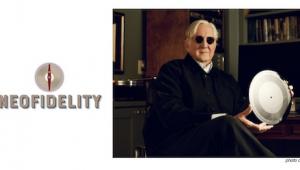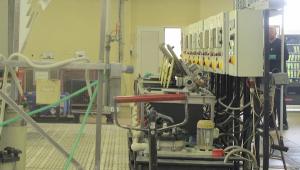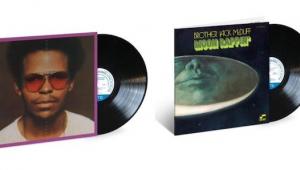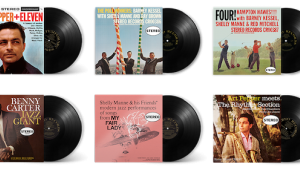an improvement over the "common, cost-cutting technique" of using ICs?
http://nwavguy.blogspot.com/2011/08/op-amps-myths-facts.html
http://nwavguy.blogspot.com/2011/08/op-amp-measurements.html
PS Audio Launches Stellar Phono Preamp

Boulder, CO: 8/6/2019-----PS Audio's first product way back in 1974 was a phono preamplifier that outperformed and replaced far more expensive units. Since then, we've offered a number of excellent phono preamps--- but the new Stellar Phono Preamplifier is the best we've ever made.
Designer Darren Myers rejected the common, cost-cutting techniques of phono preamp design: the Stellar Phono Preamp uses no ICs in the signal path and instead features all-discrete FETs and hand-selected premium components in a Class A circuit with passive RIAA equalization.
In addition, the Stellar Phono Preamp has both fixed and variable loading for moving coil cartridges, fully adjustable from the remote control. The unit's ultra-low noise allows the use of MC cartridges with output as low as 0.15 mV. Two different tonearms can be selected via the remote, with either single-ended or balanced outputs. A massive, heavily-regulated power supply and full DC coupling allow the unit to provide up to 20V rms output for powerful bass and unrestricted headroom and dynamics.
The Stellar Phono Preamp is a classic example of the PS Audio ethos: superb musical performance at a price far less than your ears would indicate. Darren talks about his design goals and methods in this brief video. Bring on the standard phono pre recommendations---and then try the new Stellar Phono Preamplifier. We think you'll be shocked, and impressed.
Features:
Moving Magnet and Moving Coil preamplifier
Fixed and variable cartridge loading adjustable from remote control
Up to 70dB of ultra low noise gain for MC cartridges as low as 0.15mv
Two inputs for two tonearms selectable from remote control
Single ended and balanced outputs
All discrete FET design
Class A analog circuitry throughout
No ICs in signal path
Up to 20V rms output for unparaleled headroom and dynamics
Passive RIAA curve for seamless performance
Hand selected premium discrete components
DC coupled from input to output for unfettered bass
Ultra low noise discrete pre and post voltage regulation stages
Low internal feedback for increased transparency and openness
No complimentary FET transistors for lifelike performance
High current oversized power transformer
Remote control
Front panel standby button
Available to ship September, 2019.
US MSRP: $2,499
- Log in or register to post comments


I stopped reading at his demand for blind testing and assertions and belief that test equipment will always tell the tale.

... rejects science.
By any chance, are you involved in the business of producing audio products?

I'm a consumer who selects products based on what sounds best in my system, including audio cables and power cables.
If you are an objectivist, I wonder why you're on Analog Planet in the first place, as Mikey would be happy to tell you why cables make a difference.
Your definition of "science" is not one to which I subscribe, because you can hear differences, time and time again.
Can the differences be measured? I am sure they can be someday, but not necessarily with the equipment we have now as we don't yet know precisely why sound quality is so affected.

... why cables make a difference, do you think he can explain how they make a difference?
Regarding differences in sound quality between products you would claim to be able to hear, but which you are presently incapable of measuring, let's assume that you are in the business of producing such items.
If you can't measure whatever parameter(s) give your products their distinctive sound quality, then how do you ensure that every product you ship to consumers exhibits that distinctive sound quality?

All he needs to know is he heard it - though I suspect he does know why.
If you are in the business of making products, there's one infallible way of telling if every product you ship exhibits that distinctive sound quality - you listen to it.
At companies like Audio Research and Boulder, to name two, a trained listener or listeners listen to each and every product before it ships.
There is actually a great story about this from Boulder - they had one amp that passed their QC testing with lab instruments, but just didn't sound… right. They took it back to the manufacturing area and double checked that it tested fine, but the listener insisted the soundstage was off. It turned out one of the amplification modules had a bad component, and it wasn't visible in frequency sweep tests or their other tests, but it WAS audible, so they developed a new test that would indeed show a failure if a module had that particular condition in the future.


... each and every product to confirm that they have that distinctive sound quality? How many can you listen to per day?
What happens if you're out sick or on vacation - do you stop shipping product until you return? Can you find or train someone else and then afford to pay them to do the listening tests?
The anecdote about Boulder doesn't apply here because you already stated that whatever is responsible for the claimed distinctive sound quality cannot be measured.

I said we don't know how to definitively measure it.
We know that most existing lab gear doesn't work to measure it.
As far as how companies operate when the designated listener is ill, that's up to each company. It's no different than wondering how some car companies function when one of their engine builders falls ill, as each engine is built by a specific worker, beginning to end, who then signs it.
Likewise, a single person at Lyra, Yoshinori Mishima, is responsible for building each cartridge (though on the Delos model he has two assistants.) What happens if he falls ill or gets hit by a bus?
Note that even with the new test, Boulder listens to each product before it leaves the building.

... then you, at present, cannot measure it.
If you have to listen to each and every product before it goes out the door, what is your production volume? Likewise, if only a single individual is tasked with building your products.

For companies that care, making sure their product sounds good is more important than sales volume.
Other industries also take similar philosophies:
https://www.mercedes-benz.com/en/lifestyle/me-magazine/one-man-one-engine/

i need a review! Would it be better than Sutherland 20\20?

are incredible. They better have some magical engineers trying to do an all discreet circuit.

















































